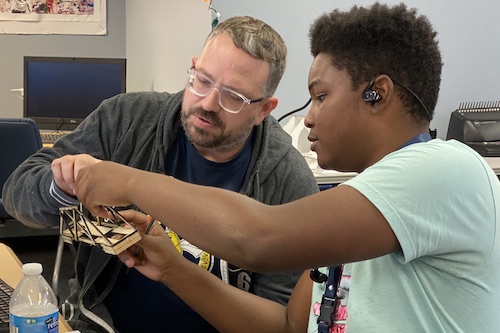We are hiring educators who believe that change in our communities starts in our classrooms.
Do you want to change the trajectory of a student’s life?
For many students in juvenile detention, education is their pathway to a successful future where they can take care of their families and contribute to the community.
We do that by connecting them to their passions!
Do you want to collaborate with like-minded professionals?
In the most innovative companies in the world, progressive, creative teams work together to identify opportunities for change and develop solutions that work.
Our educators have time, space, and permission to do the same!
Do you want the autonomy to teach creatively?
Unlike traditional school districts that mandate a prescribed curriculum, we grant autonomy to the people with the greatest understanding of what their students need.
The educators!
Are you seeking a creative working environment where you are respected and trusted?
We hire professionals who demonstrate a strong commitment to our values, have a proven history of instructional success, and are committed to working collaboratively.
And then we get out of their way!
Teaching and Learning in Juvenile Detention
The Maricopa County Juvenile Probation Department operates the Durango Facility in Phoenix, Arizona. The facility includes a public school overseen by the Maricopa County School Superintendent.
Detention education is a unique school setting that enables teachers to have more autonomy and teach with more creativity than in a traditional middle/high school. If you are looking to teach outside the box while making breakthroughs with students others have failed, juvenile detention is the perfect place!
It might seem odd that a teacher would have to enter the most structured place to break free of the traditional systems that hold them back, but the traditional school system has already failed our students; it’s time for something different.
In juvenile detention:
Class sizes are small; around 16 students per class.
Juvenile detention officers handle classroom discipline. Teachers are free to teach!
Teachers have the autonomy to creatively design engaging integrated lessons without the restrictive instructional mandates of many public schools.
Whole-child, social-emotional learning is a priority.
Teachers have 90 minutes every day for planning, collaborating with colleagues, and working on professional goals.
Teachers never have out of class supervision duties, after school or weekend activity responsibilities.
Instruction happens both in dedicated classrooms as well as on living units. To empower teachers to teach wherever, whenever, each teacher has a Microsoft Surface Pro, which can project anywhere and a cart of Chromebooks. One for each student.
School is in session 50 weeks a year. Our teachers are contracted as year-round employees who receive vacation days based on years of service.
There are currently two types of teaching positions at Detention Education:
Expanded Impact Teachers ($55,000-$65,00/year)
Expanded Impact Teachers co-plan integrated lessons that promote student engagement through differentiation, cultural responsiveness, relevance to the student’s lives, and rigorous curriculum to ensure social and academic progress.
Reach Associate($35,000-$40,00/year)
Reach Associates provide both instructional and non-instructional support to a team of teachers, as designated by the team’s Multi-Classroom Leader. They work closely with teachers to complete various administrative tasks and non-instructional tasks. They manage procedures and supervises student behavior during transitions, and unstructured activities, and while teacher(s) deliver instruction. They aid instruction by supervising time on projects, skills practice, and digital learning, and/or by instructing students in small groups or individually.





